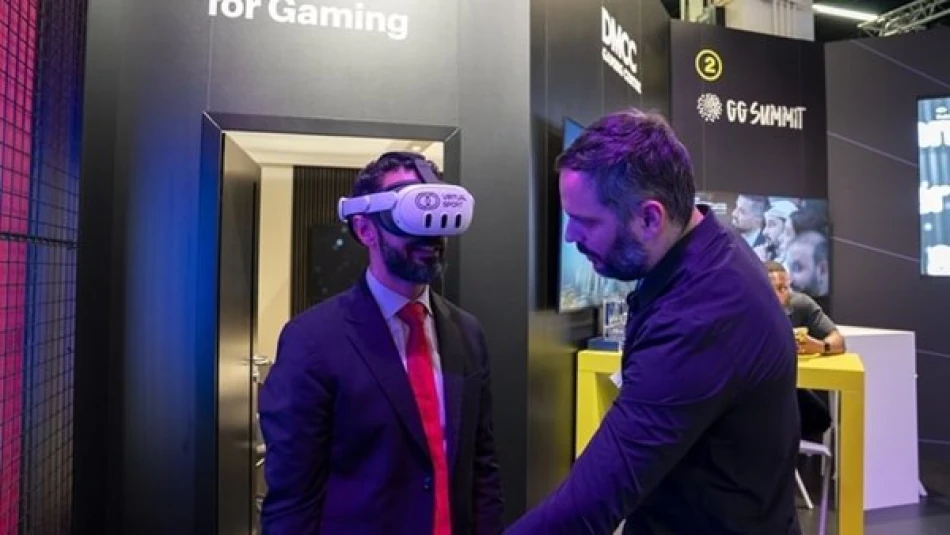
Dubai Pavilion at 'Gamescom' Attracts Thousands of Visitors and Delegations Globally
Dubai Stakes Its Claim in the Global Gaming Gold Rush at Gamescom 2025
Dubai is making an aggressive play to become a top-10 global gaming hub by 2033, showcasing its ambitious gaming sector strategy at the world's largest gaming expo in Cologne, Germany. The emirate's presence at Gamescom 2025 signals a calculated move to capture market share in an industry projected to exceed $321 billion globally, positioning itself as a serious competitor to established gaming centers like Singapore, South Korea, and California.
The $1 Billion Vision Takes Center Stage
Dubai's pavilion at Gamescom drew thousands of visitors and dozens of international delegations, all eager to explore opportunities within the emirate's rapidly expanding gaming ecosystem. The showcase highlighted the Dubai Gaming Program 2033, launched by Crown Prince Sheikh Hamdan bin Mohammed in November 2023, which targets creating 30,000 new gaming-related jobs and contributing $1 billion to the emirate's digital economy and GDP.
The program represents more than ambitious numbers—it's a strategic pivot toward high-value digital industries as Dubai diversifies beyond oil-dependent sectors. With participation from the Dubai Future Foundation, Dubai Culture and Arts Authority, and Dubai Multi Commodities Centre, the initiative demonstrates institutional commitment across multiple government entities.
Strategic Positioning in a Competitive Landscape
Learning from Regional Success Stories
Dubai's gaming push mirrors successful strategies deployed by regional competitors. The UAE's neighbor Saudi Arabia has invested heavily in gaming through its Vision 2030 program, while Singapore established itself as a gaming development hub through targeted incentives and infrastructure investments. Dubai's approach appears more focused on creating an end-to-end ecosystem rather than just attracting individual companies.
Market Timing and Global Trends
The timing coincides with a global shift in gaming investment patterns. As Western markets face saturation and regulatory challenges, Middle Eastern hubs offer attractive alternatives with favorable business environments, strategic geographic positioning between East and West, and growing local consumer markets.
Investor and Industry Implications
Abdul Aziz Al Jaziri, Deputy CEO of Dubai Future Foundation, emphasized that the Gamescom participation provided "a unique opportunity to introduce the world to Dubai's efforts in the gaming sector." This international visibility campaign suggests Dubai is targeting not just regional players but global gaming giants seeking expansion opportunities.
For investors, Dubai's gaming initiative offers several compelling factors: tax advantages, streamlined business setup processes, and access to both regional and international markets. The emirate's existing strengths in logistics, finance, and technology infrastructure provide a solid foundation for gaming companies requiring complex global operations.
Measuring Success Against Global Benchmarks
Faisal Kazim, Director of the Dubai Gaming Program, noted that hundreds of gaming companies have already established operations in Dubai since the program's launch—a promising early indicator. However, achieving top-10 global status will require competing against established hubs like Los Angeles, Tokyo, London, and Montreal, each with decades of industry development and deep talent pools.
The Gamescom Advantage
Dubai's prominent presence at Gamescom 2025—which expanded to 72 participating countries and over 1,500 exhibitors across 233,000 square meters—demonstrates sophisticated marketing strategy. By positioning itself at the industry's premier networking event, Dubai gains direct access to decision-makers from major gaming companies, independent developers, and potential investors.
Challenges and Realistic Outlook
While Dubai's gaming ambitions are substantial, success will depend on execution across multiple fronts: developing local talent, attracting international expertise, creating compelling intellectual property, and building sustainable competitive advantages beyond initial incentives. The emirate's track record in rapidly developing other sectors—from finance to aerospace—suggests institutional capability, but gaming requires different expertise and cultural understanding.
The $1 billion economic contribution target, while significant for Dubai, represents a relatively modest share of the global gaming market. Success will likely be measured not just in absolute numbers but in Dubai's ability to establish itself as a regional gaming capital and gateway to emerging markets across the Middle East and Africa.
Most Viewed News

 Layla Al Mansoori
Layla Al Mansoori






